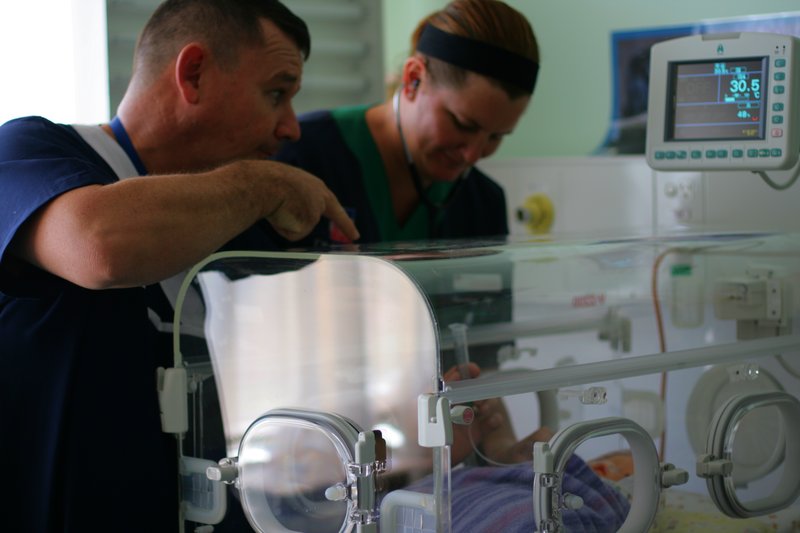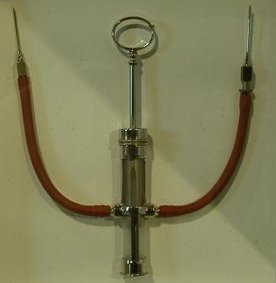|
Ruby Hall Clinic
Ruby Hall Clinic is a hospital in the city of Pune, India, established in 1959. It is a 750-bed hospital with 2,450 dedicated staffers, 300 consultants, 650 panel doctors, and 1,500 paramedical staff. It was accredited by National Accreditation Board for Hospitals & Healthcare Providers (NABH). It is a recognized Post Graduate Teaching Hospital for students of Maharashtra University of Health Sciences, National Board of Examinations, and College of Physicians & Surgeons of Mumbai. Dr. P.K. Grant is the Managing Trustee and Chief Cardiologist of Ruby Hall Clinic. History Ruby Hall Clinic was established in 1959 by Dr. K. B. Grant. In 1966, Ruby Hall Clinic was converted from a private institution owned by Dr. Grant to a public charitable trust named Poona Medical Foundation. It was later converted to the Grant Medical Foundation in 2000, of which Dr. Grant was the chairman and managing trustee. In 2012, the clinic collaborated with the Kalyani Group to launch a special in ... [...More Info...] [...Related Items...] OR: [Wikipedia] [Google] [Baidu] |
Pune, India
Pune ( ; , ISO: ), previously spelled in English as Poona ( the official name until 1978), is a city in the state of Maharashtra in the Deccan plateau in Western India. It is the administrative headquarters of the Pune district, and of Pune division. In terms of the total amount of land under its jurisdiction, Pune is the largest city in Maharashtra, with a geographical area of 516.18 sq km, though by population it comes in a distant second to Mumbai. According to the 2011 Census of India, Pune has 7.2 million residents in the metropolitan region, making it the seventh-most populous metropolitan area in India. The city of Pune is part of Pune Metropolitan Region. Pune is one of the largest IT hubs in India. It is also one of the most important automobile and manufacturing hubs of India. Pune is often referred to as the "Oxford of the East" because of its educational institutions. It has been ranked "the most liveable city in India" several times. Pune at different poin ... [...More Info...] [...Related Items...] OR: [Wikipedia] [Google] [Baidu] |
Cardiology
Cardiology () is the study of the heart. Cardiology is a branch of medicine that deals with disorders of the heart and the cardiovascular system. The field includes medical diagnosis and treatment of congenital heart defects, coronary artery disease, heart failure, valvular heart disease, and electrophysiology. Physicians who specialize in this field of medicine are called cardiologists, a sub-specialty of internal medicine. Pediatric cardiologists are pediatricians who specialize in cardiology. Physicians who specialize in cardiac surgery are called cardiothoracic surgeons or cardiac surgeons, a specialty of general surgery. Specializations All cardiologists in the branch of medicine study the disorders of the heart, but the study of adult and child heart disorders each require different training pathways. Therefore, an adult cardiologist (often simply called "cardiologist") is inadequately trained to take care of children, and pediatric cardiologists are not trained to treat ... [...More Info...] [...Related Items...] OR: [Wikipedia] [Google] [Baidu] |
Hospitals In Pune
A hospital is a healthcare institution providing patient treatment with specialized health science and auxiliary healthcare staff and medical equipment. The best-known type of hospital is the general hospital, which typically has an emergency department to treat urgent health problems ranging from fire and accident victims to a sudden illness. A district hospital typically is the major health care facility in its region, with many beds for intensive care and additional beds for patients who need long-term care. Specialized hospitals include trauma centers, rehabilitation hospitals, children's hospitals, geriatric hospitals, and hospitals for specific medical needs, such as psychiatric hospitals for psychiatric treatment and other disease-specific categories. Specialized hospitals can help reduce health care costs compared to general hospitals. Hospitals are classified as general, specialty, or government depending on the sources of income received. A teaching hospital campus c ... [...More Info...] [...Related Items...] OR: [Wikipedia] [Google] [Baidu] |
Intensive-care Unit
An intensive care unit (ICU), also known as an intensive therapy unit or intensive treatment unit (ITU) or critical care unit (CCU), is a special department of a hospital or health care facility that provides intensive care medicine. An intensive care unit (ICU) was defined by the task force of the World Federation of Societies of Intensive and Critical Care Medicine as "an organized system for the provision of care to critically ill patients that provides intensive and specialized medical and nursing care, an enhanced capacity for monitoring, and multiple modalities of physiologic organ support to sustain life during a period of life-threatening organ system insufficiency." Patients may be referred directly from an emergency department or from a ward if they rapidly deteriorate, or immediately after surgery if the surgery is very invasive and the patient is at high risk of complications. History In 1854, Florence Nightingale left for the Crimean War, where triage was ... [...More Info...] [...Related Items...] OR: [Wikipedia] [Google] [Baidu] |
Cancer
Cancer is a group of diseases involving Cell growth#Disorders, abnormal cell growth with the potential to Invasion (cancer), invade or Metastasis, spread to other parts of the body. These contrast with benign tumors, which do not spread. Possible Signs and symptoms of cancer, signs and symptoms include a lump, abnormal bleeding, prolonged cough, unexplained weight loss, and a change in defecation, bowel movements. While these symptoms may indicate cancer, they can also have other causes. List of cancer types, Over 100 types of cancers affect humans. Tobacco use is the cause of about 22% of cancer deaths. Another 10% are due to obesity, poor Diet (nutrition), diet, sedentary lifestyle, lack of physical activity or Alcohol abuse, excessive alcohol consumption. Other factors include certain infections, exposure to ionizing radiation, and environmental pollutants. infectious causes of cancer, Infection with specific viruses, bacteria and parasites is an environmental factor cau ... [...More Info...] [...Related Items...] OR: [Wikipedia] [Google] [Baidu] |
Blood Bank
A blood bank is a center where blood gathered as a result of blood donation is stored and preserved for later use in blood transfusion. The term "blood bank" typically refers to a department of a hospital usually within a clinical pathology laboratory where the storage of blood product occurs and where pre-transfusion and blood compatibility testing is performed. However, it sometimes refers to a collection center, and some hospitals also perform collection. Blood banking includes tasks related to blood collection, processing, testing, separation, and storage. For blood donation agencies in various countries, see list of blood donation agencies and list of blood donation agencies in the United States. Types of blood transfused Several types of blood transfusion exist: * Whole blood, which is blood transfused without separation. * Red blood cells or packed cells is transfused to patients with anemia/iron deficiency. It also helps to improve the oxygen saturation in blood. It can ... [...More Info...] [...Related Items...] OR: [Wikipedia] [Google] [Baidu] |
Intensive Care Unit
An intensive care unit (ICU), also known as an intensive therapy unit or intensive treatment unit (ITU) or critical care unit (CCU), is a special department of a hospital or health care facility that provides intensive care medicine. An intensive care unit (ICU) was defined by the task force of the World Federation of Societies of Intensive and Critical Care Medicine as "an organized system for the provision of care to critically ill patients that provides intensive and specialized medical and nursing care, an enhanced capacity for monitoring, and multiple modalities of physiologic organ support to sustain life during a period of life-threatening organ system insufficiency." Patients may be referred directly from an emergency department or from a ward if they rapidly deteriorate, or immediately after surgery if the surgery is very invasive and the patient is at high risk of complications. History In 1854, Florence Nightingale left for the Crimean War, where triage was used ... [...More Info...] [...Related Items...] OR: [Wikipedia] [Google] [Baidu] |
Nuclear Medicine
Nuclear medicine (nuclear radiology, nucleology), is a medical specialty involving the application of radioactivity, radioactive substances in the diagnosis and treatment of disease. Nuclear imaging is, in a sense, ''radiology done inside out'', because it records radiation radiant exitance, emitted from within the body rather than radiation that is transmittance, transmitted through the body from external sources like X-ray generators. In addition, nuclear medicine scans differ from radiology, as the emphasis is not on imaging anatomy, but on the function. For such reason, it is called a Functional imaging, physiological imaging modality. Single photon emission computed tomography (SPECT) and positron emission tomography (PET) scans are the two most common imaging modalities in nuclear medicine. Diagnostic medical imaging Diagnostic In nuclear medicine imaging, radiopharmaceuticals are taken internally, for example, through inhalation, intravenously, or orally. Then, externa ... [...More Info...] [...Related Items...] OR: [Wikipedia] [Google] [Baidu] |
Neurology
Neurology (from , "string, nerve" and the suffix wikt:-logia, -logia, "study of") is the branch of specialty (medicine) , medicine dealing with the diagnosis and treatment of all categories of conditions and disease involving the nervous system, which comprises the Human brain, brain, the spinal cord and the peripheral nervous system , peripheral nerves. Neurological practice relies heavily on the field of neuroscience, the scientific study of the nervous system, using various techniques of neurotherapy. IEEE Brain (2019). "Neurotherapy: Treating Disorders by Retraining the Brain". ''The Future Neural Therapeutics White Paper''. Retrieved 23.01.2025 from: https://brain.ieee.org/topics/neurotherapy-treating-disorders-by-retraining-the-brain/#:~:text=Neurotherapy%20trains%20a%20patient's%20brain,wave%20activity%20through%20positive%20reinforcement International Neuromodulation Society, Retrieved 23 January 2025 from: https://www.neuromodulation.com/ Val Danilov I (2023). "The O ... [...More Info...] [...Related Items...] OR: [Wikipedia] [Google] [Baidu] |
The Times Of India
''The Times of India'' (''TOI'') is an Indian English-language daily newspaper and digital news media owned and managed by the Times Group. It is the List of newspapers in India by circulation, third-largest newspaper in India by circulation and List of newspapers by circulation, largest selling English-language daily in the world. It is the oldest English-language newspaper in India, and the second-oldest Indian newspaper still in circulation, with its first edition published in 1838. It is nicknamed as "The Old Lady of Bori Bunder", and is a newspaper of record. Near the beginning of the 20th century, Lord Curzon, the Viceroy of India, called ''TOI'' "the leading paper in Asia". In 1991, the BBC ranked ''TOI'' among the world's six best newspapers. It is owned and published by Bennett, Coleman & Co. Ltd. (BCCL), which is owned by the Sahu Jain family. In the Brand Trust Report India study 2019, ''TOI'' was rated as the most trusted English newspaper in India. In a 2021 surve ... [...More Info...] [...Related Items...] OR: [Wikipedia] [Google] [Baidu] |
Hospital
A hospital is a healthcare institution providing patient treatment with specialized Medical Science, health science and auxiliary healthcare staff and medical equipment. The best-known type of hospital is the general hospital, which typically has an emergency department to treat urgent health problems ranging from fire and accident victims to a sudden illness. A district hospital typically is the major health care facility in its region, with many beds for intensive care and additional beds for patients who need long-term care. Specialized hospitals include trauma centers, rehabilitation hospitals, children's hospitals, geriatric hospitals, and hospitals for specific medical needs, such as psychiatric hospitals for psychiatry, psychiatric treatment and other disease-specific categories. Specialized hospitals can help reduce health care costs compared to general hospitals. Hospitals are classified as general, specialty, or government depending on the sources of income received. ... [...More Info...] [...Related Items...] OR: [Wikipedia] [Google] [Baidu] |







